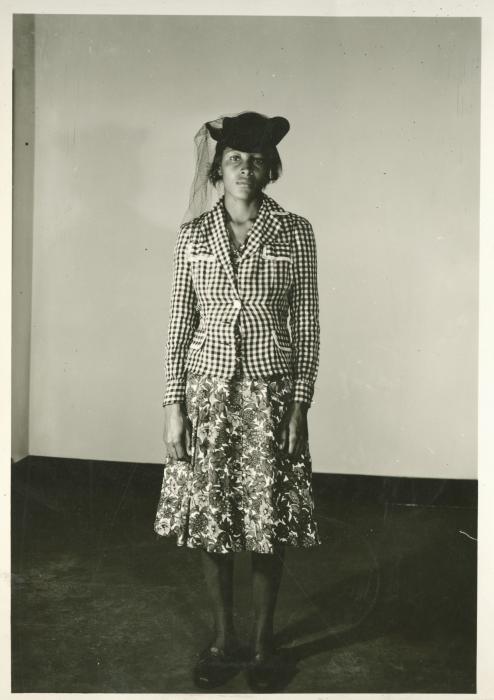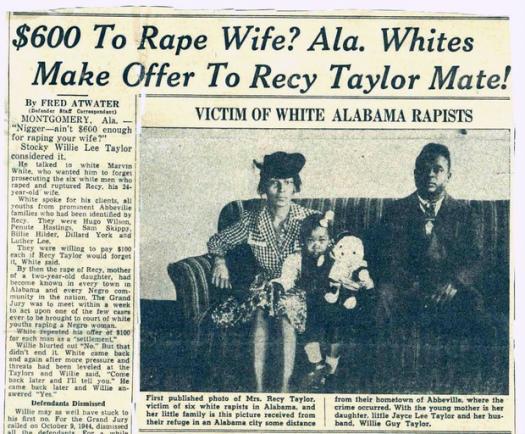When she couldn’t get justice, she just wanted an apology. It took the State sixty-seven years to say they were wrong.
On Sept. 3, 1944, 24-year old Recy Taylor was walking home from church with her friend Fannie Daniel and Fannie’s son, West. A car pulled up next to them.
Recy was kidnapped at gunpoint by seven white men. They drove to the edge of the woods where six of the men raped [pdf] her. When the men were done, they took Recy back to town and threatened to kill her if she told anyone. She spoke out anyway.
She told the authorities, but they didn’t want to listen. White men didn’t care. Two all white, all male grand juries failed to indict the men.
One of the men confessed. It was reported they offered her $600 to keep quiet. She couldn’t do that.
“I hated it happened to me like that, but it just happened to me and I couldn’t help myself,” Taylor said. “The peoples there, it seemed like they wasn’t concerned about what happened to me. They didn’t try to do nothing about it. I just get upset because I do my best to be nice to people because I don’t want people to mistreat me and do me any kind of way. And I have to live with it, ’cause I had to live with a lot with going through with this.”
Following the rape, she refused to be silenced and spoke up with help from the NAACP’s chief rape investigator Rosa Parks. When Parks went to interview Taylor, the local sheriff kept driving by the house and eventually burst in, threatening Parks with arrest if she didn’t leave town. Parks left and then launched the Alabama Committee for Equal Justice for Mrs. Recy Taylor, triggering a movement to seek justice 11 years before Parks became a civil rights hero for refusing to give up her bus seat to a white man, launching the Montgomery bus boycott.
After the 2011 publication of, “At the Dark End of the Street: Black Women, Rape, and Resistance—a New History of the Civil Rights Movement from Rosa Parks to the Rise of Black Power,” by Denise L. McGuire, Recy received a formal apology from the Alabama government via a joint resolution[pdf] on April 21, 2011.
BE IT RESOLVED BY THE LEGISLATURE OF ALABAMA, BOTH HOUSES THEREOF CONCURRING, That we acknowledge the lack of prosecution for crimes committed against Recy Taylor by the government of the State of Alabama, that we declare such failure to act was, and is, morally abhorrent and repugnant, and that we do hereby express profound regret for the role played by the government of the State of Alabama in failing to prosecute the crimes.
BE IT FURTHER RESOLVED, That we express our deepest sympathies and solemn regrets to Recy Taylor and her family and friends.
Recy never gave up hoping for that apology. She never backed down. She continued to push for the justice she rightly deserved.
[Taylor] was an American hero and an Alabama treasure who spoke up in the face of racism, hate and sexual violence,” Alabama Rep. Terri A. Sewell said in a statement. “By standing up to injustice over six decades ago, Recy Taylor inspired generations of men and women to hold perpetrators of sexual violence accountable.
During her acceptance speech [transcript] for the the Cecil B. deMille Award at the 2018 Golden Globes, Oprah Winfrey called attention to those who have endured abuse. She called attention to Recy in particular (9:07 in the video).
In 1944, Recy Taylor was a young wife and mother walking home from a church service she’d attended in Abbeville, Alabama, when she was abducted by six armed white men, raped, and left blindfolded by the side of the road coming home from church. They threatened to kill her if she ever told anyone, but her story was reported to the NAACP where a young worker by the name of Rosa Parks became the lead investigator on her case and together they sought justice. But justice wasn’t an option in the era of Jim Crow. The men who tried to destroy her were never persecuted. Recy Taylor died ten days ago, just shy of her 98th birthday. She lived as we all have lived, too many years in a culture broken by brutally powerful men. For too long, women have not been heard or believed if they dare speak the truth to the power of those men. But their time is up. Their time is up.
Their time is up. And I just hope — I just hope that Recy Taylor died knowing that her truth, like the truth of so many other women who were tormented in those years, and even now tormented, goes marching on. It was somewhere in Rosa Parks’ heart almost 11 years later, when she made the decision to stay seated on that bus in Montgomery, and it’s here with every woman who chooses to say, “Me too.” And every man — every man who chooses to listen.
I’ve interviewed and portrayed people who’ve withstood some of the ugliest things life can throw at you, but the one quality all of them seem to share is an ability to maintain hope for a brighter morning, even during our darkest nights. So I want all the girls watching here, now, to know that a new day is on the horizon! And when that new day finally dawns, it will be because of a lot of magnificent women, many of whom are right here in this room tonight, and some pretty phenomenal men, fighting hard to make sure that they become the leaders who take us to the time when nobody ever has to say “Me too” again.
Recy Taylor was courageous for never backing down. She never received justice and for surviving despite the brutality against her that night and the years after.
Recy never felt shame for what happened to her. Instead, she felt she was owed justice. Nancy Buirski, director of the 2011 documentary, “The Rape of Recy Taylor,” wants Recy to be remembered for her courage and dignity. She believes the lack of shame expressed by those in the Me Too movement have their roots with Recy and the women of the Jim Crow South.
Women today can say Me Too because Recy said it so many years ago.



Jerry Lewis
This is so well done…congrats, Irene
Jina Red Nest
Cant say enough to you for bringing that to light in the hope that it will change someone who has no clue what people go through in lives that aren’t right in their faces or in their lives to do something about it